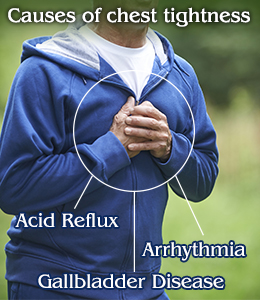Tightness in the chest that is experienced especially after eating can come about due to a number of conditions that range from the chronic to the easily curable. It is therefore important to know what these are such that the necessay treatment measures can be adopted for the same.
Ever experienced chest tightness after eating? This article will tell you why that happens and when. Read on...

Many times, a heavy meal can lead to a feeling of chest tightness. This may or may not be accompanied by other symptoms like shortness of breath, bloating and flatulence. Chest tightness is an indication of certain underlying health conditions that need to be looked into. Let us review the same in the following article.
Acid Reflux
One of the main reasons for chest tightness after having a meal is due to acid reflux. Acid reflux is acidity. This condition has mainly got to do with stomach acids. The tightness in chest after eating is experienced after the gastric glands secrete an excess of acids. This, along with a tightness in the chest, can also lead to gas and heartburn. There are many reasons that can lead to an acid reflux reaction and a subsequent chest tightness. Some of these reasons are,
- Avoiding having meals at fixed and regular intervals.
- Eating foods that are known to be rich and fatty.
- Maintaining constant late hours.
- Consuming fatty and fried foods constantly.
- Excessive smoking habits.
- Uncontrollable alcohol consumption.
- Obesity
- Malfunctioning of the digestive system.
- Skipping meals, especially breakfast and staying on an empty stomach.
- Hyper secretion of hydrochloric acid.
- Experiencing constant negative emotions.
- Pregnancy
Dyspepsia
Dyspepsia is another reason for why tightness in the chest after eating can come about. Dyspepsia includes having one or more of these signs.
- Ulcers
- Bloating
- Inflammation of the stomach
- Vomiting
- Nausea
- Upset stomach
- Burping
- Heartburn
- GERD (Gastroesophageal reflux disease)
- Cancer
Overeating
Sometimes people do not realize what and how much they eat. They haven't learned how to listen to their stomachs. Tightness in chest after eating can also be caused due to overeating. When a person eats beyond his capability to digest the food, he ends up putting tremendous pressure on the digestive system and the stomach. This can lead to chest tightness. When you eat food that is more than the requirement of the body, the body begins to react in different ways and one of the main reactions or results is that of chest tightness.
In order to avoid tightness in the chest, try following these steps.
- Instead of having 3 large meals, have 5 small meals throughout the day so that there is no unnecessary pressure on the stomach.
- As far as possible, avoid having any liquid during the meal.
- Instead, wait for an hour after the meal to have water.
- Another reason that could lead to the same could be constricting your normal breathing by donning very tight clothes - so ditch those and opt for loose fitting ones.
Gallbladder Disease
The gallbladder is a pear-shaped organ that stores bile. This bile is required in the digestion process. Sometimes however there is an excess of cholesterol in the gallbladder which leads to the formation of crystallized stones called gallstones. Gallstones are hardened solid stones of bile that contain calcium, cholesterol or bile salts. Gallstones will lead to tremendous pain in the upper and lower regions of the abdomen. The pain might even begin to radiate from the shoulders and shoulder blades. It could be accompanied by vomiting and nausea as well. One of the key signs of gallbladder stones is that the pain will not subside and continue to get worse as time passes. Gallbladder disease can be brought on due to several reasons.
- High cholesterol levels
- Obesity
- People who have Crohn's disease
- Intake of contraceptive pills which have high levels of estrogen (for women)
Arrhythmia
Arrhythmia denotes any type of irregular heartbeat. It could be slow, racing or a skipped beat. This is not normal and can be brought on after eating, which can in turn lead to chest tightness. There are several reasons that cause arrhythmia. These are...
- When some other part (in the heart) and not the sinus node acts as the pacemaker.
- When the normal path for electrical conduction is altered.
- Abnormal rhythm of the sinus node.
- Heart block
- It usually occurs in middle aged people and is most likely to develop among those people who've had a history of heart diseases before.
Chest tighteness that comes about due to overeating can have at its base several conditions, as this article has illustrated. It is therefore important to understand what these are such that they can be prevented and treated well enough.


 Many times, a heavy meal can lead to a feeling of chest tightness. This may or may not be accompanied by other symptoms like shortness of breath, bloating and flatulence. Chest tightness is an indication of certain underlying health conditions that need to be looked into. Let us review the same in the following article.
Many times, a heavy meal can lead to a feeling of chest tightness. This may or may not be accompanied by other symptoms like shortness of breath, bloating and flatulence. Chest tightness is an indication of certain underlying health conditions that need to be looked into. Let us review the same in the following article.